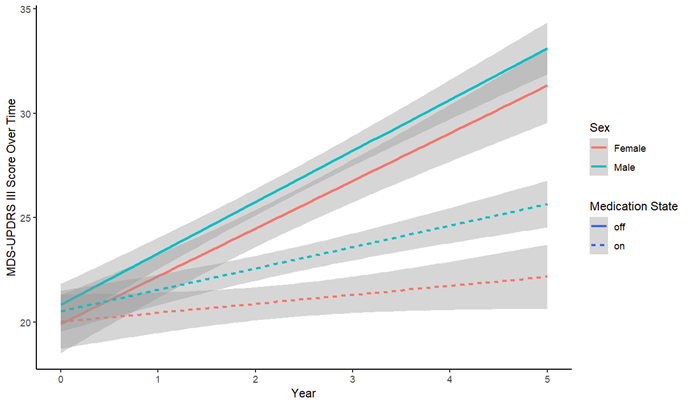Objective: To evaluate differences between males and females in trajectory of motor response to levodopa in early Parkinson’s disease (PD).
Background: Previous research has shown that females with PD demonstrate a more robust motor response to levodopa than males with PD. However, it is unknown whether the influence of sex on motor response to levodopa changes over time in early PD.
Method: Data from the Parkinson’s Progression Markers Initiative (PPMI) were analyzed longitudinally at one-year intervals for five years. After excluding individuals who underwent deep brain stimulation, 428 individuals with Parkinson’s disease were included in the analyses (277 males, 151 females; average time since diagnosis = 6.6 months). Motor response to levodopa was evaluated by the difference in scores on the Movement Disorder Society Unified Parkinson’s Disease Rating Scale motor subscale (MDS-UPDRS III) between the on and off states of levodopa with larger difference scores suggesting a more robust response to levodopa. A mixed effects model was used to determine the effects of sex over the five years while controlling for age, levodopa equivalent daily dose, time since diagnosis, and cognition (Montreal Cognitive Assessment).
Results: MDS-UPDRS III scores increased annually in both on and off states of levodopa in males (1.3 points/year on, 2.6 points/year off) and females (0.7 points/year on, 2.4 points/year off). However, males and females demonstrated significantly different rates of change of difference scores on MDS-UPDRS III between on and off states over time, with an annual increase in difference scores of 1.3 points in males and 1.7 points in females (p = 0.019).
Conclusion: Our results are consistent with those of prior studies indicating that females demonstrate a more robust motor response to levodopa. Our findings suggest that this difference in motor response to levodopa is present early in the disease and increases over time. Further research is warranted to assess potential differences in non-motor responses to levodopa between males and females.
[figure1]
To cite this abstract in AMA style:
M. Gevertzman, A. Hooyman, J. Longhurst, M. Landers. Sex differences in motor response to levodopa in early Parkinson’s disease [abstract]. Mov Disord. 2023; 38 (suppl 1). https://www.mdsabstracts.org/abstract/sex-differences-in-motor-response-to-levodopa-in-early-parkinsons-disease/. Accessed December 22, 2025.« Back to 2023 International Congress
MDS Abstracts - https://www.mdsabstracts.org/abstract/sex-differences-in-motor-response-to-levodopa-in-early-parkinsons-disease/

